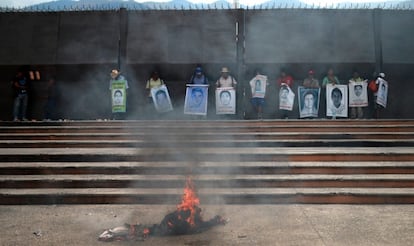Mexico’s top human rights prosecutor resigns in midst of political storm
Questions over government inquiry into Iguala massacre costs Peña Nieto official her job


The embattled head of the human rights division at Mexico’s Attorney General’s Office resigned her post on Monday in the wake of mounting criticism over the government’s struggles to deal with escalating violence and impunity across the country.
Eliana García Laguna’s resignation comes just three months after Attorney General Jesús Murillo Karam stepped down under pressure following the investigation into the September kidnappings and murders of 43 students in Iguala, Guerrero state.
Mexico’s prosecutor’s office has lost its credibility as unresolved human rights abuse cases grow
Over the past few months, the country’s top prosecutor’s office – commonly referred to by its Spanish acronym PGR – has lost credibility as the number of unresolved human-rights abuse cases continues to grow.
Murillo Karam’s successor, Arely Gómez González, had promised to make human rights her number-one priority when she took over in late February.
“We are committed to becoming the first guarantors of human rights because our work should be based on listening to and protecting people,” she said at the time.
But after just a few months at the post, Gómez is facing a shakeup within her own ranks after her assistant attorney general for human rights handed in her resignation.
Under García Laguna’s tenure, the PGR designed a plan to search for missing persons – including Central Americans migrants – who disappeared after crossing into Mexico in search of new lives in the United States. Officials also signed important agreements with the International Red Cross to help with their progress on the issue.
Although the level of drug violence under President Enrique Peña Nieto has dropped since the term of his predecessor Felipe Calderón (2006-2012), human-rights abuse cases have escalated.
A major focus of this issue has been the government’s official inquiry into the killings of 43 teaching students who took part in a protest and were reportedly captured and executed at a nearby trash dump under orders from local police officials.
There are more than 25,000 missing-person cases in Mexico, according to official figures
The families of the students have criticized the way authorities have handled the investigation, citing inconsistencies in the conclusions of the case. Some believe that their loved ones were shot dead by the Mexican military.
At the same time, a team of experts from the Inter-American Human Rights Commission said that there wasn’t enough evidence to determine what exactly happened to the students despite the Mexican government’s insistence that their bodies were burned after the massacre.
According to official figures, there are more than 25,000 missing-person cases in Mexico.
In March, National Human Rights Commission president Luis Raúl González urged the Peña Nieto administration to introduce fast-track legislation to deal with torture and forced disappearances.
Besides the Iguala case, the Mexican government has also been under pressure over the killings of 22 alleged drug traffickers, reportedly at the hands of the military in Tlataya.
García Laguna, who has only been on the job since last June and was a human rights activist before joining the government, had the support of many experts and civic organizations.
“Her proximity to the victims and organizations was very positive,” said José Antonio Guevara, director of the NGO Mexican Commission for the Defense and Promotion of Human Rights. “She was the first person in many years who has been able to do this from a government position.”
But the Iguala massacre took a toll on her short tenure.
Felipe Cruz, a spokesman for the families of the students, gave little importance to her departure.
“For us, her resignation doesn’t mean a thing. No matter who is in that position, the conclusions will remain the same. They removed Murillo, and the situation has moved neither backward nor forward. They can remove the entire Cabinet and nothing will change.”
Tu suscripción se está usando en otro dispositivo
¿Quieres añadir otro usuario a tu suscripción?
Si continúas leyendo en este dispositivo, no se podrá leer en el otro.
FlechaTu suscripción se está usando en otro dispositivo y solo puedes acceder a EL PAÍS desde un dispositivo a la vez.
Si quieres compartir tu cuenta, cambia tu suscripción a la modalidad Premium, así podrás añadir otro usuario. Cada uno accederá con su propia cuenta de email, lo que os permitirá personalizar vuestra experiencia en EL PAÍS.
¿Tienes una suscripción de empresa? Accede aquí para contratar más cuentas.
En el caso de no saber quién está usando tu cuenta, te recomendamos cambiar tu contraseña aquí.
Si decides continuar compartiendo tu cuenta, este mensaje se mostrará en tu dispositivo y en el de la otra persona que está usando tu cuenta de forma indefinida, afectando a tu experiencia de lectura. Puedes consultar aquí los términos y condiciones de la suscripción digital.








































